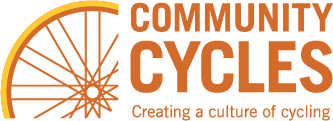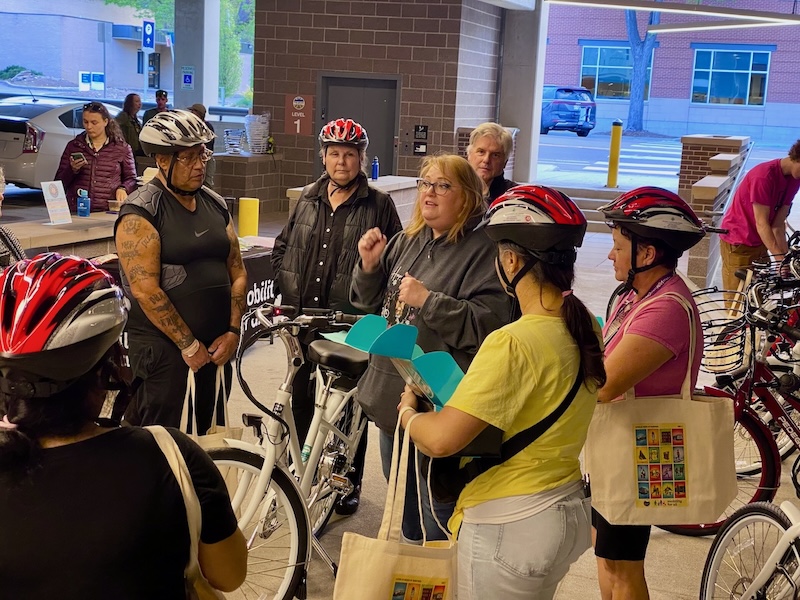Thanks to the Community Access to Electric Bikes grant program through the Colorado Energy Office, Community Cycles was able to provided eBike Packages (ebike, helmet, lock, basket/pannier) to forty-six income-qualified residents and individual workers in Boulder County, Colorado. This ‘loaner to owner’ project ran from Spring 2024 to June 30, 2025, where low-income community members got to try out an ebike for a year as a ‘loaner’, and then as of June 30 they ‘own’ the ebikes.
The purpose of the grant was to promote commuting to and from work, along with building a car-lite lifestyle of using the ebike for errands, appointments and social engagements. There are multiple benefits that bicycle commuting delivers including: a sense of improved autonomy; greater physical and mental health; reduced stress about public transit challenges including multiple connections or service delays and individual and family finances relief by eliminating the need to own a costly, polluting car.
Powered by Partnerships
Community Cycles chose partners in the Boulder County community for participants and ebikes. These low-income communities are in contrast to the 2023 program that was similar to this one. There we partnered with low-income employees of the University of Colorado, Boulder Valley School District and Boulder Community Health, with a focus on commuting to work. This time the focus was on both commuting by ebike and also other aspects like using the ebike for getting around town for appointments, errands and social occasions.
We teamed up with:
- Boulder County Housing Authority: Aspinwall/Josephine Commons, The Spoke, and Casa de la Esperanza
- Boulder County Mobility for All
- Pedego Electric Bikes of Boulder The Pedego models chosen are reliable ebikes that continue to serve our participants well, with range and functionality perfect for the needs of individuals who commute to work and ride for other reasons mostly in the 5-10 mile range.
- Boulder Community Health provided helmets for all participants
Embrace eBikes for Daily Trips and Improved Wellbeing
We distributed the eBike Packages in late spring 2024 to give participants a full summer of riding—an ideal window to build new biking habits before colder weather set in. Excitement was high at the pickup events, with many participants already planning routes to work, errands, and social outings.
Most participants had some past biking experience, which helped them quickly adapt to using an ebike regularly. The majority met the goal of riding at least three days a week, using the bikes not only for commuting but also for everyday needs. For those who don’t drive due to disability or mobility challenges, the ebike offered newfound independence and a reliable transportation alternative.
Participants also shared unexpected benefits: better physical and mental health, savings on gas and car maintenance, and less stress from traffic or parking. Many appreciated the opportunity to ease into or unwind from their workdays with a quiet, car-free ride.
Real-World Use Reveals What Works
This project offered valuable insights into how participants—especially older adults—used e-bikes in daily life. Most favored them for errands, appointments, and social outings rather than commuting. While riders enjoyed exploring their communities, secure bike parking remained a concern.
E-bike education classes provided useful knowledge, like general bike maintenance and upkeep which will help to prolong their usability.
Empowering Independence and Sustainability: Lessons and Successes from Our eBike Program
This project clearly demonstrated the transformative impact that access to an e-bike can have on individuals and communities. By removing cost and access barriers, the “loaner to owner” model empowered 46 low-income residents and workers in Boulder County to adopt a more active, independent, and car-lite lifestyle. Whether used for commuting, errands, or social connection, e-bikes became a valuable tool for mobility, wellbeing, and financial relief.
The success of this initiative was made possible through strong partnerships, thoughtful implementation, and responsive support throughout the year. As Community Cycles looks ahead, the lessons learned will guide future programs that aim to expand access and encourage everyday biking. With the right support, e-bikes can continue to open doors to healthier, more connected, and more sustainable communities.

